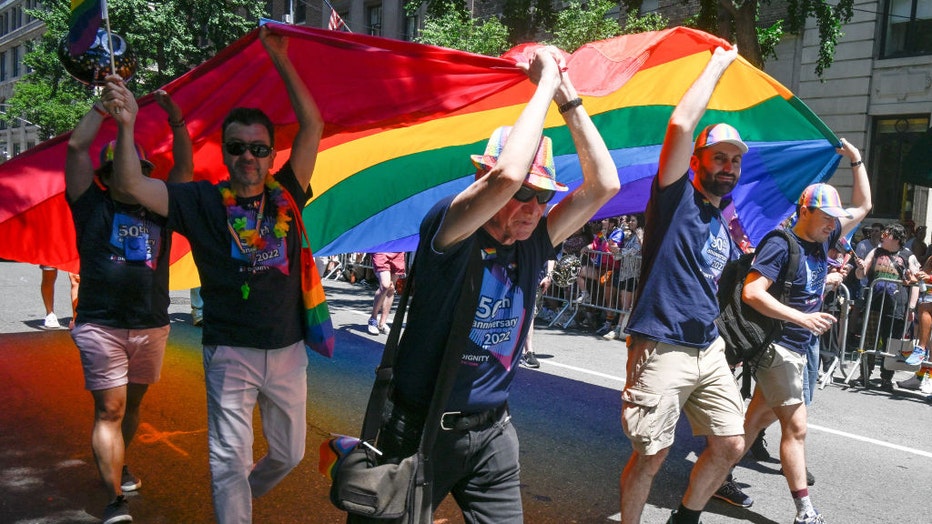FBI, DHS warn of increased terrorist threat to LGBTQIA+ events ahead of Pride Month
The FBI and Department of Homeland Security are warning Americans about the threat of foreign terrorist organizations targeting LGBTQIA+-related events and venues as Pride Month kicks off in June.
The agencies cited that in February 2023, an English-language ISIS messaging board contained "anti-LGBTQIA+ rhetoric and rallied against the growth and promotion of the LGBTQIA+ community." Messages also called for ISIS followers to conduct attacks on soft targets, though they weren't specific to LGBTQIA+ venues.
Also, June 12 will mark the 8th anniversary of the Pulse Nightclub Orlando shooting, where a gunman killed 49 people and wounded 53. The attack was celebrated by ISIS followers.

NEW YORK, NEW YORK - JUNE 26: March participants carry a large pride flag during the 2022 New York City Pride march on June 26, 2022 in New York City. (Photo by Astrida Valigorsky/Getty Images)
Last year, three ISIS sympathizers attempted to attack a Pride parade in Vienna, Austria, using knives and a vehicle as part of the attack, according to the agencies.
RELATED: FBI, Homeland Security issue terror alert ahead of NYC Pride 2024
New York City's annual Pride march draws around 50,000 marchers yearly, and the monthlong event draws as many as two million people to the city.
"Disappointing, disconcerting, and sadly not new. We get threats annually. We get threats throughout the year," said Sandra Perez, the Executive Director of NYC Pride.
According to Perez, NYC Pride works closely with law enforcement and says there are no plans to cancel or alter any Pride events next month.
"This is a time not only for the LGBTQ community to come out and show their pride, but I think it's really, really important for allies to show up as well," said Perez.
RELATED: Supreme Court declines to intervene in transgender bathroom debate
The FBI and DHS listed possible indicators of a potential threat activity:
- Violent threats made online, in person, or via mail.
- Unusual or prolonged testing or probing of security measures at events or venues.
- Photography of security related equipment, personnel, or access points consistent with pre-operational surveillance without a reasonable alternative explanation.
- Unusual surveillance or interest in buildings, gatherings, or events.
- Attempts to gain access to restricted areas, bypass security, or impersonate law enforcement officials.
- Observation of or questions about facility security measures, including barriers, restricted areas, cameras, and intrusion detection systems without a reasonable alternative explanation.
- Eliciting information from facility personnel regarding the nature of upcoming events, crowd sizes, busiest times of day, etc. without a reasonable alternative explanation.
- Attempts to enter a restricted area, bypass security, or impersonate law enforcement officials.
FOX 5 New York contributed to this report. This story was reported from Los Angeles.

